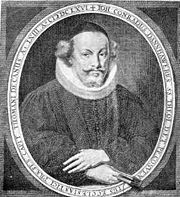
Johann Conrad Dannhauer
Encyclopedia

Lutheran Orthodoxy
Lutheran orthodoxy was an era in the history of Lutheranism, which began in 1580 from the writing of the Book of Concord and ended at the Age of Enlightenment. Lutheran orthodoxy was paralleled by similar eras in Calvinism and tridentine Roman Catholicism after the...
theologian and teacher of Spener.
Dannhauer began his education in the gymnasium
Gymnasium (school)
A gymnasium is a type of school providing secondary education in some parts of Europe, comparable to English grammar schools or sixth form colleges and U.S. college preparatory high schools. The word γυμνάσιον was used in Ancient Greece, meaning a locality for both physical and intellectual...
at Strasburg
Strasbourg
Strasbourg is the capital and principal city of the Alsace region in eastern France and is the official seat of the European Parliament. Located close to the border with Germany, it is the capital of the Bas-Rhin département. The city and the region of Alsace are historically German-speaking,...
and was the master of a thorough philosophical training before he commenced his theological work in 1624. He continued his studies at Marburg
Marburg
Marburg is a city in the state of Hesse, Germany, on the River Lahn. It is the main town of the Marburg-Biedenkopf district and its population, as of March 2010, was 79,911.- Founding and early history :...
, Altorf
Altorf
Altorf is a commune in the Bas-Rhin department in Alsace in north-eastern France.The town has a long history. Its most interesting monument is the part-Romanesque, part-Baroque church of St. Cyriaque, which until the French revolution belonged to a Benedictine Abbey.-See also:*Welf, count of...
, and Jena
Jena
Jena is a university city in central Germany on the river Saale. It has a population of approx. 103,000 and is the second largest city in the federal state of Thuringia, after Erfurt.-History:Jena was first mentioned in an 1182 document...
, lecturing at the same time on philosophy and linguistics and winning recognition at Jena by his exegesis of the Epistle to the Ephesians
Epistle to the Ephesians
The Epistle of Paul to the Ephesians, often shortened to Ephesians, is the tenth book of the New Testament. Its authorship has traditionally been credited to Paul, but it is considered by some scholars to be "deutero-Pauline," that is, written in Paul's name by a later author strongly influenced by...
. Returning to Strasburg in 1628, he entered upon an active career as administrator, teacher, and theologian. Made seminary inspector in 1628, he became in the following year professor of oratory
Oratory
Oratory is a type of public speaking.Oratory may also refer to:* Oratory , a power metal band* Oratory , a place of worship* a religious order such as** Oratory of Saint Philip Neri ** Oratory of Jesus...
, and in 1633 professor of theology, pastor of the cathedral
Strasbourg Cathedral
Strasbourg Cathedral or the Cathedral of Our Lady of Strasbourg is a Roman Catholic cathedral in Strasbourg, France. Although considerable parts of it are still in Romanesque architecture, it is widely consideredSusan Bernstein: , The Johns Hopkins University Press to be among the finest...
, and president of the ecclesiastical assembly. Although the judgment of his contemporaries, Bebel, Spener, and others, placed him in the front rank of the theologians of the time, Dannhauer has received scant justice at the hands of posterity. The influence exerted upon Spener by his teacher must not be underestimated because of the formal tone of the poem dedicated by the founder of the Pietists to his teacher's memory. Their relations were certainly not characterized by the warmth of personal friendship, but were rather in the nature of an intercourse based on common intexests. Dannhauer ordained Spener, and in all probability secured for him the post of private tutor at the court of the elector palatine. Spener, in return, seems to have been connected with the preparation of the second edition of the Hodosophia for the press and to have acted as critic of another work of Dannhauer's which has not yet been identified. The estrangement between the two was apparently caused by Dannhauer's nephew, Balthasar Bebel, who was in control of the theological faculty at Strasburg at the time of the
publication of Spener's Pia desideria. Dannhauer was a prolific writer, his principal works being as follows: Hodosophia christiana sine theologia positiva (1649); Katechismusmilch oder Erklärung des kirchlichen Katechismus (1657-78) and Liber conscientiae apertus sive theologia conscientiaria (1662-67).

